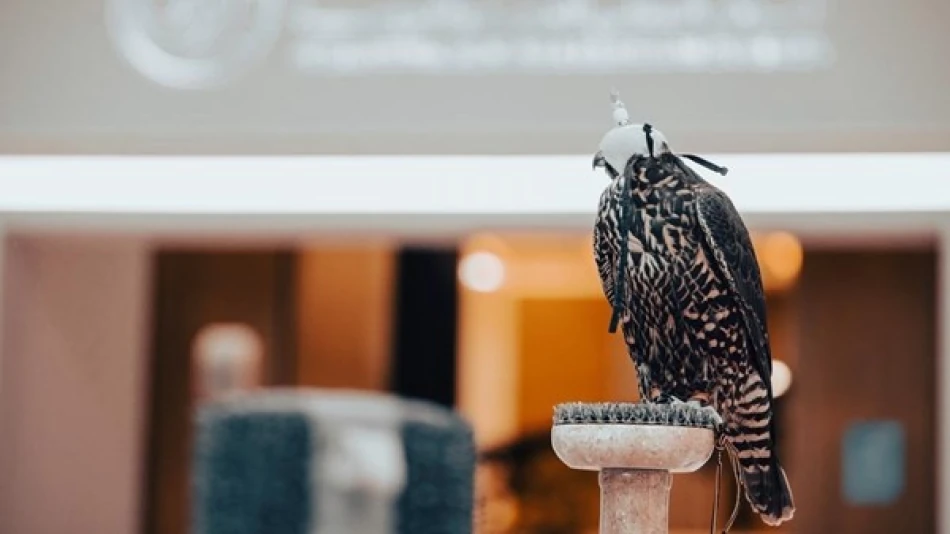
Abu Dhabi's Falconry and Equestrian Center Captivates Visitors with Innovative Digital Heritage Platforms
UAE Heritage Center Harnesses AI to Bridge Traditional Sports with Modern Audiences
The Abu Dhabi International Hunting and Equestrian Exhibition is witnessing a digital transformation as the Hamdan bin Mohammed Heritage Center deploys artificial intelligence to showcase traditional Emirati sports and cultural practices. This tech-forward approach signals a broader regional trend of Gulf states modernizing their cultural preservation efforts to engage younger generations while maintaining authenticity.
Digital Innovation Meets Ancient Tradition
At the 22nd edition of the prestigious Abu Dhabi exhibition, running until September 7, the Heritage Center has unveiled an interactive digital platform that combines heritage education with entertainment. The centerpiece features AI-powered displays showcasing Fazaa championships—traditional Emirati sporting competitions that have been the backbone of local cultural identity for generations.
The platform also broadcasts live programming from "Al Oula Radio," the center's dedicated heritage radio station, creating a multimedia experience that immerses visitors in Emirati culture through multiple sensory channels.
Strategic Tournament Calendar Reveals Cultural Priorities
The exhibition served as the launch pad for announcing the official Fazaa championships schedule for the 2025-2026 season. This timing is strategic—using an international platform to generate momentum for traditional sports competitions demonstrates how cultural institutions are adapting marketing strategies typically reserved for commercial sports leagues.
Why This Digital Heritage Push Matters Now
Rashid Hareb Al Khasouni, Director of Fazaa Championships Management at the Heritage Center, emphasized that the exhibition provides an "ideal platform to enhance awareness among emerging generations about the rich heritage of the nation." This isn't merely cultural preservation—it's cultural evolution in response to demographic realities.
The UAE's population is increasingly young and internationally diverse, with expatriates comprising roughly 90% of residents. Traditional heritage preservation methods risk becoming museum pieces without technological integration that speaks to digital-native audiences.
Regional Context: The Gulf's Heritage Technology Race
This initiative places the UAE alongside other Gulf states investing heavily in digital cultural preservation. Saudi Arabia's Vision 2030 includes similar heritage digitization projects, while Qatar leveraged advanced technology for cultural showcases during the 2022 World Cup. The competition extends beyond economics to cultural soft power projection.
Market Implications for Cultural Tourism
The Heritage Center's approach reflects broader economic diversification strategies across the Gulf. Cultural tourism represents a growing revenue stream as oil-dependent economies seek alternatives. By making traditional sports and heritage more accessible through technology, the UAE positions itself to capture tourism segments beyond luxury shopping and business travel.
The exhibition's theme, "Renewable Heritage," encapsulates this philosophy—tradition doesn't mean static preservation but dynamic adaptation. This approach could serve as a model for other nations grappling with similar challenges of maintaining cultural identity while embracing modernization.
The Broader Strategic Vision
The Heritage Center's participation aligns with its strategy to strengthen the UAE's cultural and heritage presence regionally and internationally. This isn't coincidental timing—the center is positioning traditional Emirati sports as distinctive cultural exports, potentially creating new pathways for international engagement beyond the typical diplomatic and commercial channels.
As the exhibition continues to attract enthusiasts of falconry, hunting, equestrian sports, and heritage arts from around the world, the integration of AI technology with traditional practices suggests a sustainable path forward for cultural preservation in an increasingly digital world.
Most Viewed News

 Layla Al Mansoori
Layla Al Mansoori






